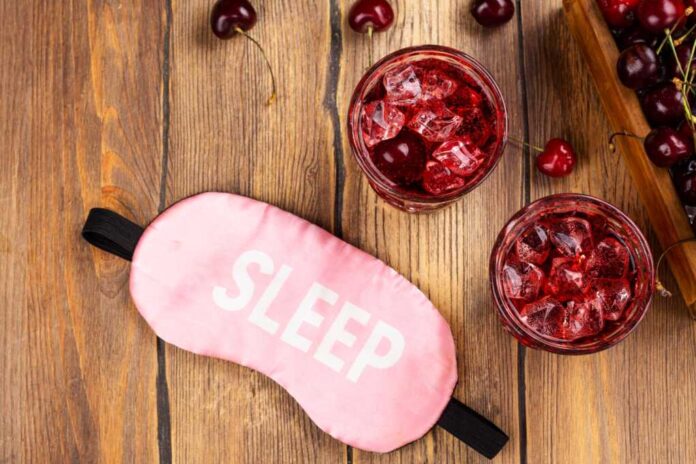
The rise of the “Sleepy Girl Mocktail” on TikTok, a blend of seltzer, tart cherry juice, and magnesium powder, highlights a broader cultural moment: our collective quest for better sleep.
As social media escalates our search for quick fixes to age-old problems, this trend encapsulates a growing desire to find natural, accessible solutions to the universal challenge of achieving restful sleep.
But beyond its social media fame, the real question is whether this viral concoction holds up under scientific scrutiny as a viable tool for enhancing sleep quality.
The Science Behind the Ingredients
The appealing claim of the sleepy girl mocktail centers on its trio of ingredients, each with its own connection to sleep physiology.
Magnesium, a key player in over 300 enzymatic reactions in the body, has a critical role in supporting sleep by regulating neurotransmitters that signal the brain’s transition to sleep.
Its deficiency is often linked to disrupted sleep patterns and insomnia, suggesting that supplementation could benefit those lacking in this essential mineral.
Tart cherry juice brings to the table not just its palatable tartness but also melatonin, the hormone responsible for regulating sleep-wake cycles. Alongside melatonin, cherries are rich in anthocyanins and tryptophan, which may enhance melatonin production and support sleep.
Meanwhile, seltzer’s role, primarily as a mixer, subtly nods to the importance of hydration in sleep quality, even though it doesn’t directly induce sleep.
Evaluating the Effectiveness
While each ingredient individually harbors potential sleep benefits, the crux of the matter lies in whether their combination in a mocktail can significantly impact sleep quality.
The individual effects of magnesium and cherry juice on sleep have been documented to some extent, with magnesium playing a role in reducing insomnia symptoms and cherry juice potentially improving sleep duration and quality due to its melatonin content.
However, the scientific community remains cautious about overpromising results without comprehensive studies specifically examining the mocktail’s combined effect.
A Psychological Ingredient
Beyond the physical ingredients, the sleepy girl mocktail incorporates a psychological aspect: the power of routine in sleep hygiene.
The act of preparing and consuming a bedtime beverage can signal to the brain that it’s time to wind down, fostering a conducive environment for sleep. This psychological component, often overlooked, could be as significant as the physiological effects of the mocktail’s ingredients.
Comparative Remedies and Lifestyle Factors
The conversation around the sleepy girl mocktail opens up a broader discussion on other dietary and lifestyle interventions for sleep improvement.
Warm milk, herbal teas, and certain nuts and fruits have been traditionally associated with better sleep, offering a range of options for those looking to enhance their sleep quality through diet.
Addressing lifestyle factors such as screen time, physical activity, and stress management can provide a more holistic approach to improving sleep.
The Verdict
While the sleepy girl mocktail might not be a magic bullet for sleep troubles, it represents a step towards recognizing the importance of diet and routines in sleep health.
The intersection of nutrition, psychology, and physiology in this trend underscores a multidimensional approach to wellness that resonates with contemporary searches for natural, integrative health solutions.
As research continues to unfold, the potential of dietary interventions in sleep enhancement remains a promising, albeit cautiously optimistic, frontier in the quest for restorative sleep.






















